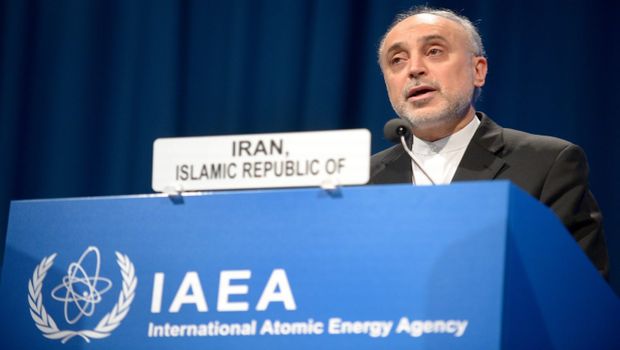
Ali Akbar Salehi, head of Iran’s Atomic Energy Organization and former foreign minister of Iran, delivers a speech at the IAEA General Conference in Vienna, Austria, September 16, 2013. (EPA/ROLAND SCHLAGER)
Dubai, Reuters—Iran resumed talks on its nuclear programme with the International Atomic Energy Agency (IAEA) on Saturday, the official IRNA news agency said, in discussions expected to broach sensitive military-related issues.
The UN atomic agency hopes to persuade Iran to finally start addressing long-held suspicions that it may have researched how to build atomic bombs.
Tehran has rejected the accusations of weaponization-related work as baseless and said it will cooperate with the IAEA to clear up any “ambiguities”.
Iran was represented in the discussions by Reza Najafi, its envoy to the IAEA, while the team from the UN nuclear watchdog was led by deputy IAEA director general Tero Varjoranta, IRNA said.
Saturday’s meeting comes 10 days before Tehran and world powers, building on a landmark interim deal that took effect last month, start talks on a long-term accord on Iran’s nuclear aspirations that would avert the threat of a Middle East war.
The spokesman for Iran’s Atomic Energy Organisation, Behrouz Kamalvandi, was reported on Friday as saying that Iran’s aim was “to answer the IAEA’s questions” at the talks.
Diplomats are cautiously optimistic that after Saturday’s talks in Tehran the team of senior IAEA inspectors will be able to show at least some progress in gaining Iran’s cooperation.
Iran-IAEA ties have improved since last year’s election of a relative moderate, Hassan Rouhani, as president of Iran on a platform to ease the country’s international isolation.
Under an agreement signed in November, the IAEA has already visited a heavy water production plant and a uranium mine in Iran. However, those first steps did not go to the heart of its investigation and Western diplomats will watch Saturday’s meeting closely to see whether the next phase achieves that.
The IAEA wants Iran to clarify its activities in a range of areas of potential application to developing bombs, including various experiments and computer calculations.
Western diplomats hope an accord will lead to Iran scaling back its nuclear programme sufficiently to deny it the capability to assemble a nuclear weapon anytime soon.
The IAEA’s investigation is focused on the question of whether Iran sought atomic bomb technology in the past and, if it did, to determine whether such work has since stopped.
Although separate, the IAEA’s inquiry is still closely aligned with the wider-ranging diplomacy between Tehran and the six powers—the United States, Russia, China, France, Britain and Germany.
Iran says its nuclear programme is peaceful and that it is Israel’s assumed atomic arsenal that threatens peace.
